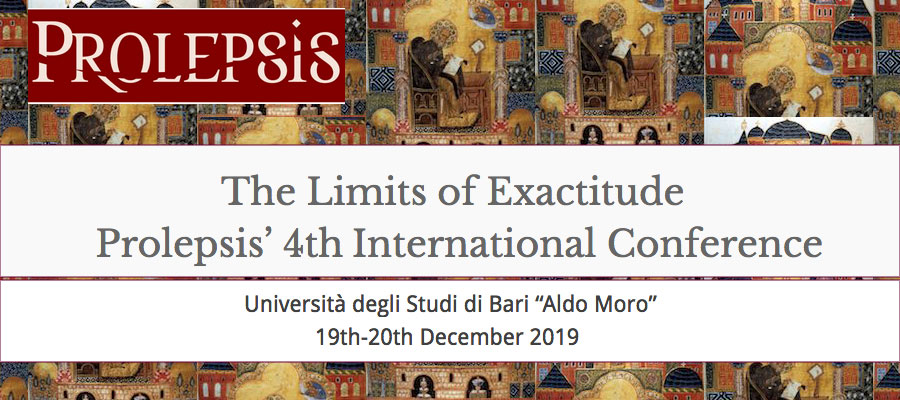The Limits of Exactitude, Prolepsis’ 4th International Conference, Università degli Studi di Bari “Aldo Moro”, December 19–20, 2019
Exactitude is the third of the Six Memos for the Next Millennium by Italo Calvino (Cambridge MA, 1988). According to Calvino ‘exactitude’ is a «well-defined and well-calculated plan for the work in question; an evocation of clear, incisive, memorable images […]; a language as precise as possible both in the choice of words and in the expression of the subtleties of thought and imagination». The aim of Prolepsis’ 4th International Conference is to reflect on Calvino’s definition applying it to the Classical, Late-Antique and Medieval Worlds. This year the conference will be particularly keen on – but not limited to – the following topics:
- Accuratio vel ambiguitas in speech, argumentation and narration.
- Ambiguous, inaccurate and disconcerting communication from the author, and potential reader response.
- Metrical and musical exactitude and its limits.
- Exactitude in treatises (scientific, rhetorical, grammatical).
- Quoting, misquoting and misplacing.
- Accurate and inaccurate titles, and their transmission.
- Limits in the material evidence (manuscripts, papyri, inscriptions, formation of corpora, mise en page, stichometry).
- Exactitude, doubt, ambiguity in the history of transmission (from ancient lexica, etymologica, and commentaries to modern scholarship).
- Examples of Exactitude and Ambiguity in Ancient and Modern Translations.
- Exactitude and Ambiguity in ancient and modern reception.
- Hypercorrection, lacunae, conjectures and obsession for completeness.
- Exactitude in historical and documentary reconstructions.
- Beginnings and endings of ancient and medieval works: doubtful and exact endings, incipit ex abrupto, etc.
- Finished and Unfinished / Clear and Unclear / Perfect and Imperfect in the philosophical reflection.
The participation in the conference as speaker is open to postgraduate students and early career researchers.
